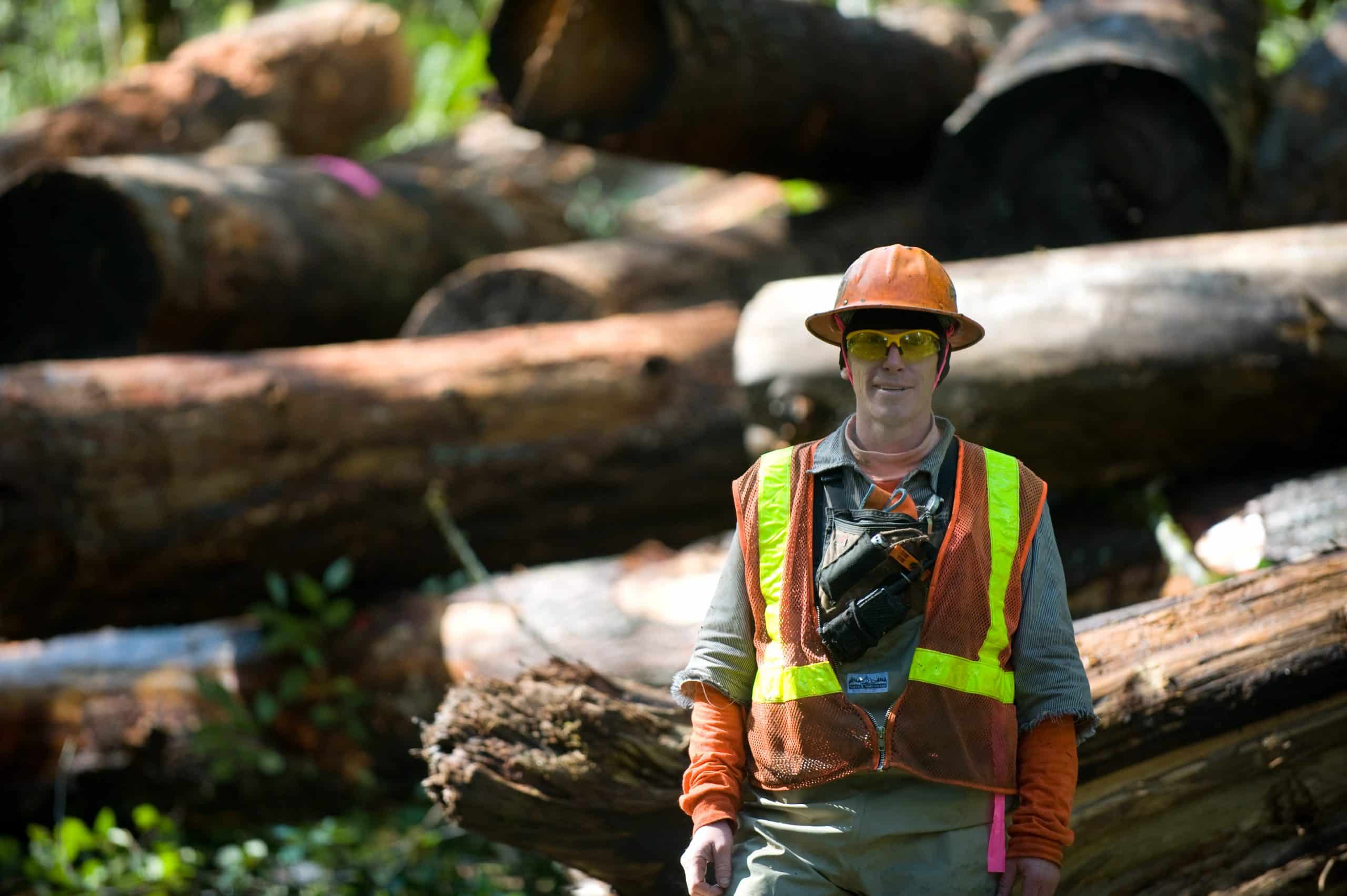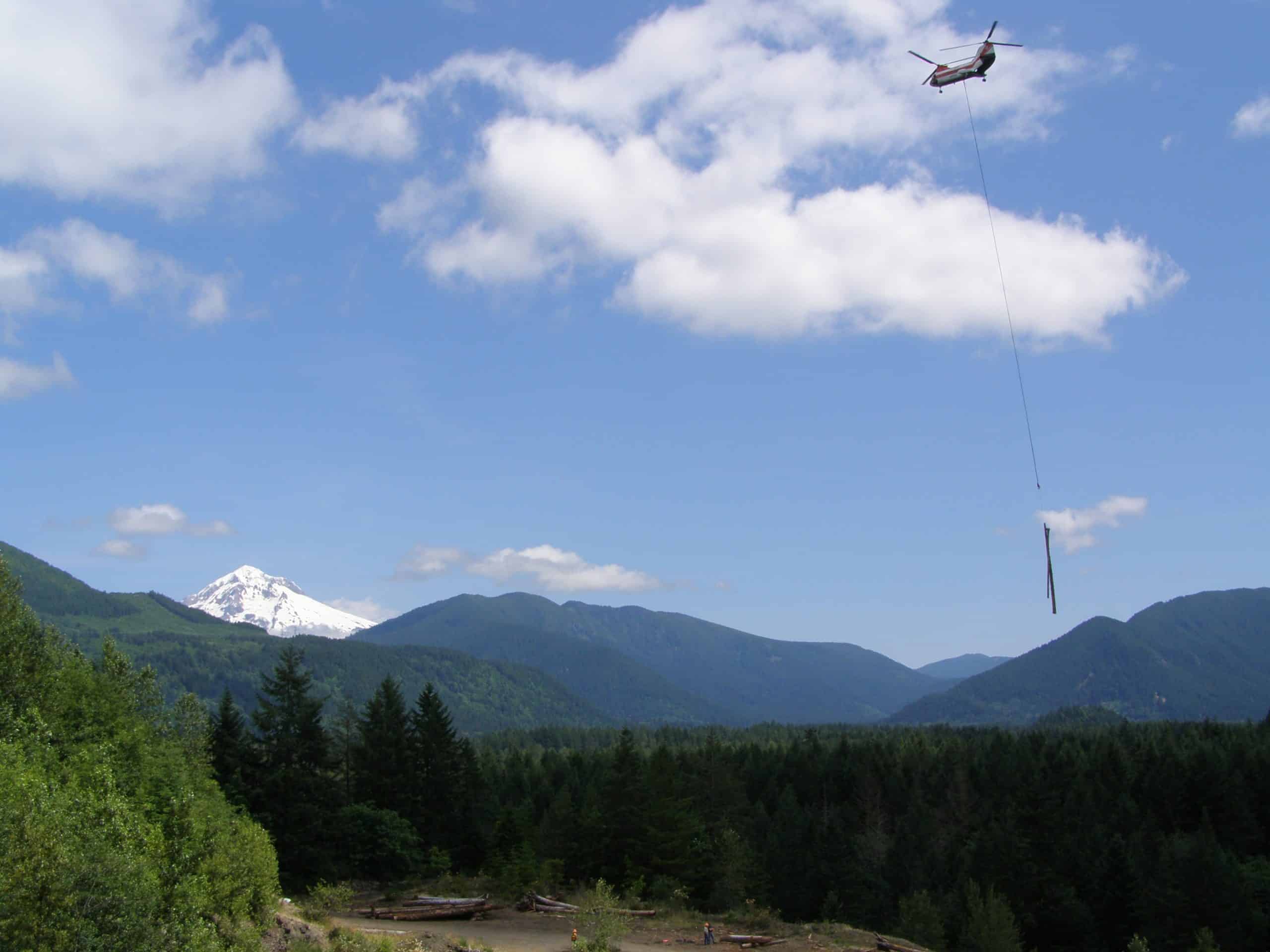Columbia Helicopters: Home for the Summer
Columbia Helicopter choppers travel the world. They carry soldiers in Afghanistan and equipment to jungles in Papua New Guinea. They help build radio towers, ski lifts, and backcountry bridges.
But for Operations Manager Dave Horrax, there’s no place like home.
The heavy lift helicopter operator has been in business in Oregon for 60 years, and a partner with The Freshwater Trust (TFT) for more than a decade. TFT contracts with Columbia to carry logs and gravel to strategic places throughout the Sandy River basin in an effort to improve native fish habitat.
“This is a company with very local roots, named after a river,” said Horrax. “Our services are worldwide, but we really value the work we do here with The Freshwater Trust. It’s a natural extension of who we are.”
This summer, TFT, Columbia and other partners will build 33 large wood structures, helping to push water back onto the floodplain and creating more juvenile rearing habitat for salmon.
“We work in places where there isn’t a lot of access,” said Horrax. “Using helicopters, you don’t have to build any roads, which can take a lot of time and money and have impacts on the environment.”
Road construction is one of the actions that negatively impacted native fish habitat in the Sandy basin. Removal of natural woody debris by the Army Corps of Engineers, due to the belief that it exacerbated flooding, was also a big factor.

Columbia Helicopters helps TFT place large wood on rivers to improve habitat for native fish populations.
“Many of our contracts involve taking large wood out of a remote place,” said Horrax. “Our work with TFT to put wood in the river is the opposite. It’s like reverse logging.”
Horrax started his career with Columbia on a logging crew after finishing a degree in forestry at the University of Montana. The company started doing stream restoration in the nineties.
“What drew me to this work then is still what draws me in now,” he said. “No two days are the same, and there are a lot of challenges, like weather, permitting and scheduling. This is all true, seat-of-the-pants type flying.”
During a narrow window in the summer, when the weather cooperates and the ink is dry on permits, Horrax and his team fly a 10,000 lift capable helicopter from a launch pad in the forest to a staging site, where towering piles of logs have been donated from the U.S. Forest Service (USFS) and Bureau of Land Management (BLM).
Not unlike a claw game at an arcade, a rigger at the log staging area deftly hooks one of the massive logs to a steel cable, gives a signal to the pilot, and as if it were a twig, the log – sometimes two at a time – flies into the air and to a place within the river corridor that’s been strategically designated by TFT and other restoration professionals. Sometimes, boulders and tons of gravel for spawning are moved in a similar fashion.

A Columbia Helicopter carries large wood to TFT's project site in the Sandy Basin.
The team works fast – as helicopter fuel and expert time are expensive, clocking in around $8,000 an hour.
“Anytime there’s a flying machine involved, there are a lot of variables,” said Horrax. “Sometimes, we just have to turn around and go home. You don’t fly unless everything is just right.”
But when it is, and a helicopter lifts from ground to sky, those days are among Mark McCollister’s best.
McCollister is TFT’s Habitat Restoration Director. He’s been the project manager for TFT’s work in the Sandy since the organization was Oregon Trout.
“They’re our muscle,” said McCollister. “The relationship has made results possible and given us the ability to act at a pace and at a scale that yield tangible results.”
Since beginning this work, thousands of miles of stream function have been restored, and the spawning of native fish has increased by 300 percent in certain places.
“We put gravel in there, and there are redds in that spot the same year,” said Horrax. “That matters to us. Most of us are old time loggers who float and fish here now. It’s our home river.”
Despite stay at home orders or social distancing measures, Columbia Helicopters is prepared to fly for TFT again this summer. They currently have a dozen helicopters continuing to operate overseas. Their maintenance shops are still open.
“We’ve been able to keep operating and, in many cases, been deemed an essential service,” said Horrax. “I know that many of us feel lucky that staying at home means we’re also working at home.”
May 1, 2020#helicopter #large wood #local partners #partnership #Sandy River Basin
Enjoying Streamside?
This is a space of insight and commentary on how people, business, data and technology shape and impact the world of water. Subscribe and stay up-to-date.
Subscribe- Year in Review: 2023 Highlights
By Ben Wyatt - Report: Leveraging Analytics & Funding for Restoration
By Joe Whitworth - Report: Transparency & Transformational Change
By Joe Whitworth - On-the-Ground Action – Made Possible By You
By Haley Walker - A Report Representing Momentum
By Joe Whitworth

